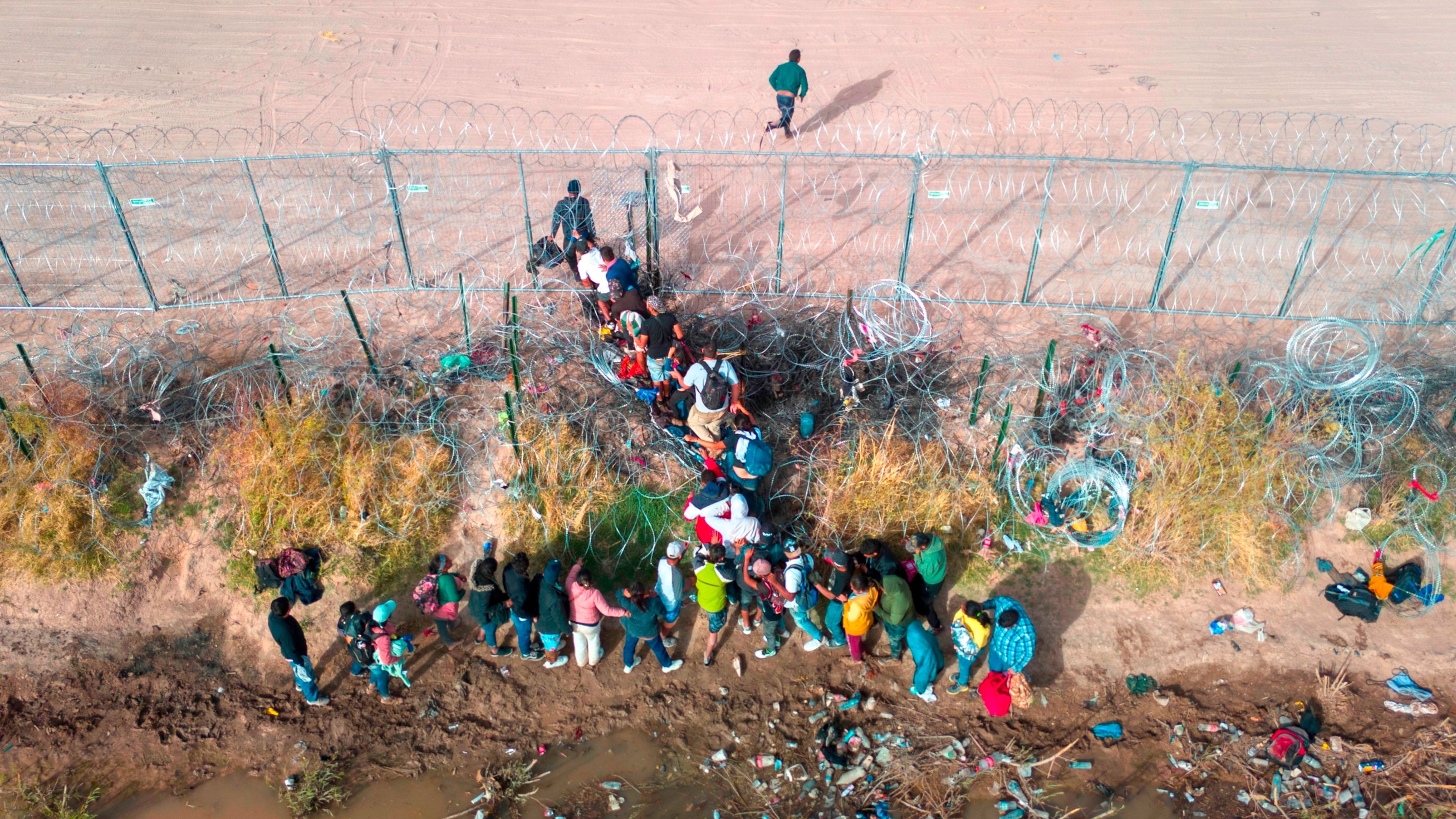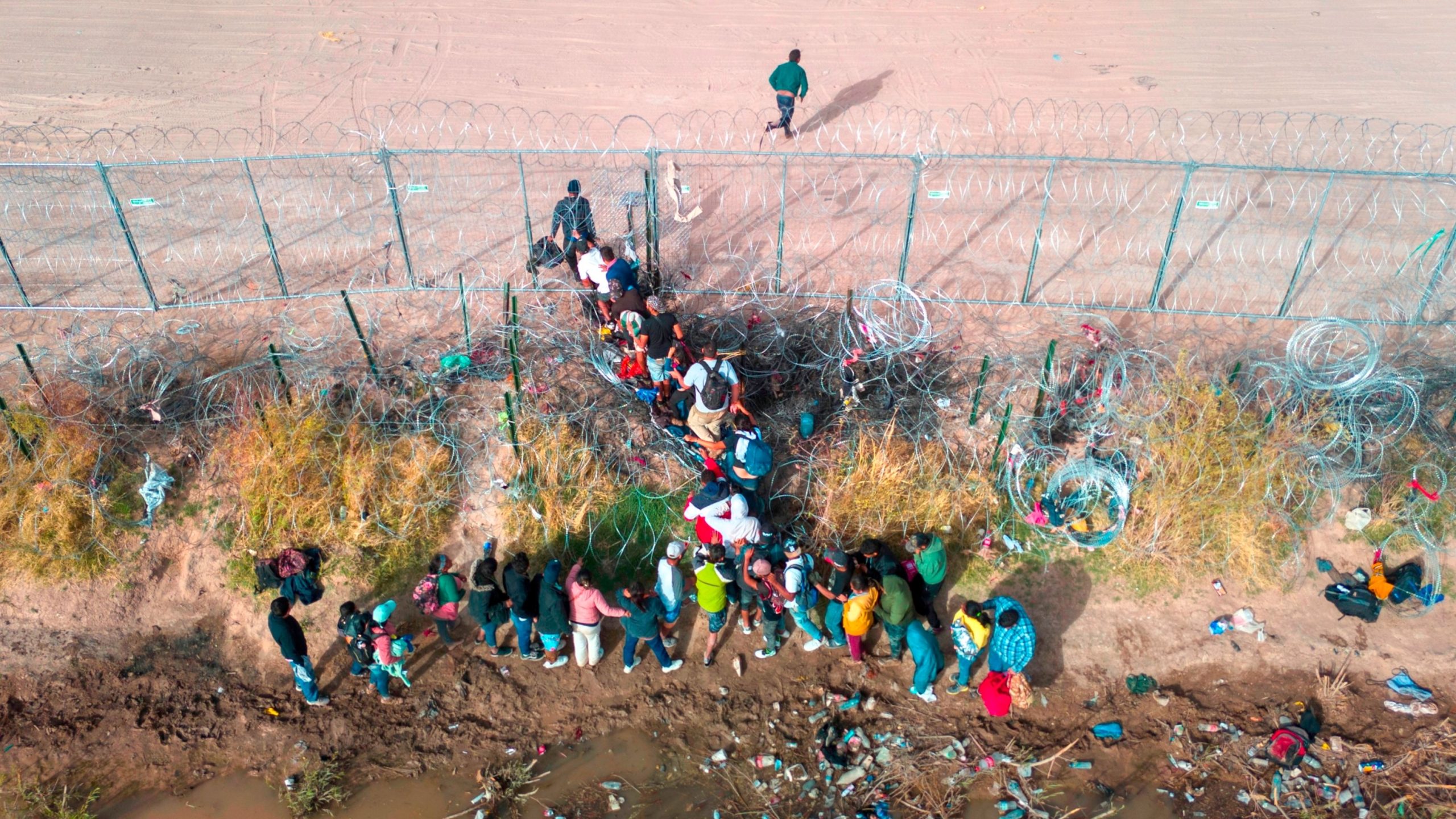The Supreme Court has rejected a Biden administration request to intervene and keep Texas’s strict immigration enforcement law, known as SB 4, on hold while it is challenged in lower courts.
The law would authorize local and state law enforcement to arrest migrants they suspect crossed into the state illegally. It would also also give judges the power to order migrants to be transported to a port of entry and returned to Mexico regardless of their country of origin.
The Biden administration has argued that immigration law is solely the responsibility of the federal government, and not local jurisdictions, as laid out in the Constitution.
“This Court has long recognized that the regulation of entry and removal of noncitizens is inseparably intertwined with the conduct of foreign relations and thus vested ‘solely in the Federal Government,'” the administration wrote in a filing with the U.S. Supreme Court earlier this month.
Texas, meanwhile, has argued that it is within its rights to arrest migrants because SB 4 is applicable under the State War Clause of the Constitution, which allows states to act when it is “actually invaded, or in such imminent Danger as will not admit of delay.”
Texas Gov. Greg Abbott reacted to the decision on X, the platform formerly known as Twitter, saying it was “clearly a positive development.”
Justice Sonia Sotomayor, in a dissent joined by Justice Ketanji Brown Jackson, said Tuesday the decision “invites further chaos and crisis in immigration enforcement.”
“Texas can now immediately enforce its own law imposing criminal liability on thousands of noncitizens and requiring their removal to Mexico,” Sotomayor wrote. “This law will disrupt sensitive foreign relations, frustrate the protection of individuals fleeing persecution, hamper active federal enforcement efforts, undermine federal agencies’ ability to detect and monitor imminent security threats, and deter noncitizens from reporting abuse or trafficking.”

In an aerial view, immigrants pass through coils of razor wire while crossing the U.S.-Mexico border on March 13, 2024, in El Paso, Texas. The wire was placed by the troops as part of Texas Gov. Greg Abbott’s “Operation Lone Star” to deter migrants from crossing into Texas.
John Moore/Getty Images, FILE
“The Court gives a green light to a law that will upend the longstanding federal-state balance of power and sow chaos, when the only court to consider the law concluded that it is likely unconstitutional,” she continued. “This law implicates serious issues that are subject to ongoing political debate, and Texas’s novel scheme requires careful and reasoned consideration in the courts to determine which provisions may be unconstitutional. Although the Court today expresses no view on whether Texas’s law is constitutional, and instead defers to a lower court’s management of its docket, the Court of Appeals abused its discretion by entering an unreasoned and indefinite administrative stay that altered the status quo. This Court stands idle. Because I cannot, I dissent.”
Justice Elena Kagan also filed a short dissent, saying she believes the government has met the standard for a stay of the law pending appeal.
All six of the Court’s conservative justices agreed with the decision to allow SB4 to take effect for now.
Justice Amy Coney Barrett, in a concurring opinion joined by Justice Brett Kavanaugh, said she preferred to allow the Fifth Circuit U.S. Court of Appeals to render judgment first on whether SB 4 should be blocked pending ongoing litigation.
A decision by that court could come any day.
“If a decision does not issue soon, the applicants [the Biden administration] may return to this Court,” Barrett wrote.
The Supreme Court recently made a decision that allows the controversial Texas Senate Bill 4 (SB4) immigration law to be implemented temporarily. This decision has sparked a heated debate among lawmakers, activists, and citizens across the state.
SB4, also known as the “show me your papers” law, was signed by Governor Greg Abbott in May 2017. The law requires local law enforcement officers to cooperate with federal immigration authorities and allows them to question the immigration status of anyone they detain. It also punishes local officials who refuse to comply with federal immigration laws.
Opponents of SB4 argue that it encourages racial profiling and undermines trust between law enforcement and immigrant communities. They also believe that it is unconstitutional and violates the Fourth Amendment, which protects against unreasonable searches and seizures.
Supporters of the law, on the other hand, argue that it is necessary to enforce immigration laws and keep communities safe. They believe that local officials should not be able to pick and choose which federal laws to enforce.
The implementation of SB4 has been met with resistance from several cities and counties in Texas, including Austin, San Antonio, and Houston, who have filed lawsuits to block the law. These cities argue that SB4 is unconstitutional and infringes on their rights to govern themselves.
The Supreme Court’s decision to allow SB4 to be implemented temporarily has only added fuel to the fire. While the court did not rule on the constitutionality of the law, it did allow it to go into effect while legal challenges continue to play out in lower courts.
This decision has left many immigrant communities feeling fearful and uncertain about their future in Texas. They worry about being targeted by law enforcement and separated from their families.
Overall, the debate over SB4 is far from over. As legal challenges continue to make their way through the courts, it is clear that this issue will remain a divisive and contentious one for the foreseeable future. In the meantime, immigrant communities in Texas will continue to live in fear of being targeted and discriminated against under this controversial law.



